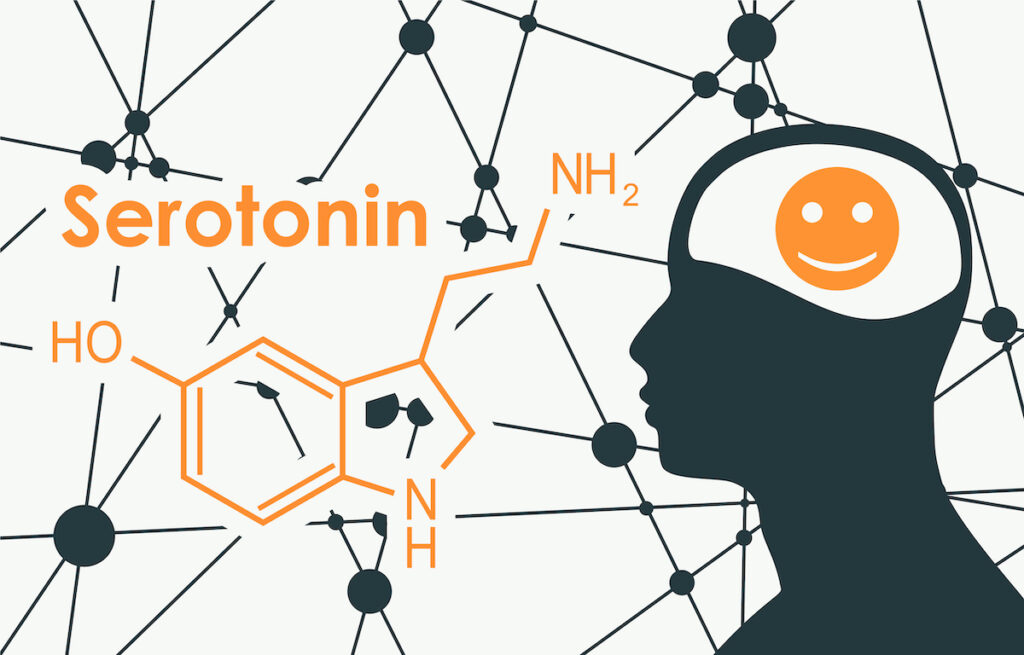
The serotonin hypothesis of affective (mood) disorders is over 50 years old (Coppen., 1965), and like a lot of hypotheses from that era, was built on a combination of clinically observed phenomena and psychopharmacology.
At its basic level it suggested that lowered levels of monoamines (dopamine, noradrenaline and/or serotonin (5-hydroxytryptamine, 5-HT)) contributed to the construct of depression, based on the observation that depleting monoamines by reserpine led people to experience depression symptoms, and that iproniazid (a treatment for tuberculosis) contributed some of its therapeutic effects through actions on (preventing degradation of) serotonin, in addition to other monoamines (Schildenkraut, 1967), (Jauhar, Browning and Cowen, 2023).
The hypothesis has undergone revisions over the years (and evidence has changed, e.g. reserpine findings challenged (Strawbridge et al, 2022)), and latterly incorporated both experimental medicine and molecular imaging studies. Genetic research also suggested a link between depression and polymorphisms in the gene for serotonin binding protein and life events. The use of the Selective Serotonin Reuptake Inhibitors (SSRIs) in the 1990s coincided with an exponential increase in research in this area (as well as the sales of these drugs), and possible hyperbole relating to the monoamine hypothesis of depression. Over the years this optimism has waned, and though SSRIs are no doubt effective for a proportion of people, they are not a panacea for depression. This has led some to question the validity of the research concerning the serotonin system in depression.
In this context, Moncrieff et al. (2022) conducted an umbrella review to examine whether the serotonin system is implicated in the aetiology of depression.

The serotonin hypothesis of depression was introduced decades ago, yet remains relevant in understanding the aetiology of depression.
Methods
The authors conducted an umbrella review (a review of systematic reviews and meta-analyses), in which evidence from these sources is collected, appraised and synthesised.
They searched databases including PubMed, EMBASE and PsycINFO via the Healthcare Databases Advanced Search tool. They identified 6 areas they wished to examine:
- Serotonin and serotonin metabolite, 5-HIAA, concentrations in body fluids;
- Serotonin receptor binding;
- Serotonin transporter (SERT) levels;
- Tryptophan depletion studies;
- SERT gene polymorphisms; and
- SERT gene-environment interactions.
The PROSPERO pre-specified protocol stated inclusion of
“Any systematic research synthesis including systematic reviews, meta-analysis, umbrella reviews and individual patient meta-analysis or very large dataset analysis based on a pre-specified set of studies or dataset.” and for participants, “Inclusion: Adults with depression and healthy volunteers”.
The authors included studies involving people with depressive disorders, or, for experimental studies, healthy volunteers in which mood was a measured outcome. Where greater than five reviews or large analyses existed, only the five most recent studies were included. Animal studies and studies exclusively concerned with depression in physical conditions or a specific subtype of depression were excluded.
The authors applied various quality criteria including AMSTAR-2 (A MeaSurement Tool to Assess systematic Reviews) and their own version of GRADE (Grading of Recommendations, Assessment, Development and Evaluations) criteria for assessing certainty. The latter involved two authors taking pre-defined criteria and agreeing consensus on whether these were measured or not, then agreeing a ‘level of certainty’ as to the evidence.
Results
361 publications were identified, and 17 studies fulfilled inclusion criteria.
For tryptophan depletion studies they state, “In areas in which no systematic review or meta-analysis had been done within the last 10 years, we also selected the ten most recent studies at the time of searching (December 2020) for illustration of more recent findings.”
Serotonin and 5-HIAA concentrations
Of the three studies included, the authors stated that one meta-analysis demonstrated lower levels of plasma 5-HT in post-menopausal women with depression, which did not meet statistical significance. The other two meta-analyses did not find an association between 5-HIAA concentrations in cerebrospinal fluid (CSF) and depression.
In summary, the studies failed to demonstrate a statistically significant association between serotonin and 5-HIAA levels and depression.
Serotonin 5-HT1A receptor binding
The authors restricted their analysis to studies concerning 5HT1A receptors only. The authors stated that the 5HT1A receptor was an ‘auto-receptor’, i.e. a pre-synaptic receptor where serotonin inhibits its own further release into the synapse. The authors stated that: “if depression were to be the result of reduced serotonin activity caused by abnormalities in the 5HT1Areceptor, people with depression would be expected to show increased activity of 5HT1A receptors, compared to those without”.
Two reviews satisfied criteria. The authors found that the majority of results across both reviews suggest there was either no difference, or lower binding, to the 5HT1A receptor in people with depression compared to controls.
If using the authors’ scientific rationale above, the findings suggest those with depression have either no change or an increase in levels of serotonin.
Serotonin transporter (SERT) levels
Three reviews were identified examining serotonin transporter (SERT) levels, and the authors state, “Overall, the data indicated possible reductions in SERT binding in some brain areas, although areas in which effects were detected were not consistent across the reviews.”
Tryptophan depletion
The authors identified two reviews concerning the effect of tryptophan depletion on mood. One of the reviews found that people with a family history of depression showed a greater reduction in mood following tryptophan depletion, compared to sham treatment. In both reviews, people with depression showed greater mood reduction following tryptophan depletion.
The authors also included the 10 most recent studies investigating the effect of tryptophan depletion on mood. They concluded that tryptophan depletion had no convincing effect on mood.
“Data from studies involving volunteers mostly showed no effect” and “Across both reviews, studies involving people diagnosed with depression showed slightly greater mood reduction following tryptophan depletion than sham treatment overall, but most participants had taken or were taking antidepressants and participant numbers were small.”
SERT gene and gene-environment interactions
Two meta-analyses showed a statistically significant association between the 5-HTTLPR (serotonin-transporter-linked promoter region) and depression. However, two more recent studies did not find an association between the SERT gene and depression. Similarly, although the authors found that earlier studies suggested a statistically significant interaction between the SERT gene and depression, some recent studies did not.
In the discussion they state, “there is no convincing evidence that depression is associated with, or caused by, lower serotonin concentrations or activity.” and “Most studies found no evidence of reduced serotonin activity in people with depression compared to people without, and methods to reduce serotonin availability using tryptophan depletion do not consistently lower mood in volunteers.”
The authors state that areas of research that provided moderate or high certainty, based on their modified GRADE criteria, showed no association between markers of serotonin activity and depression. They comment that some areas suggest findings consistent with increased serotonin activity, which was of low certainty. The authors note that tryptophan depletion studies showed very low certainty of evidence of lowered serotonin activity or availability in those with a family history of depression. No comment is made on trytophan depletion studies in people with depression.
They conclude, “This review suggests that the huge research effort based on the serotonin hypothesis has not produced convincing evidence of a biochemical basis to depression.”

This review (Moncrieff et al, 2022) indicated that those with depression have either no significant change or an increase in levels of synaptic serotonin.
Conclusions
From their analysis of the literature the authors conclude that:
There is no convincing evidence that depression is associated with, or caused by, lower serotonin concentrations or activity.

The authors concluded that no convincing evidence suggests links of association or causation between depression and lower serotonin concentration.
Strengths and limitations
A strength of the paper is that the protocol was registered with PROSPERO. However, it was updated to reflect the modification of the quality rating system and include the authors modified GRADE criteria for certainty. Although the measurement of study quality looks conventional, the GRADE criteria are not. The authors state they are in keeping with prior literature (Kennis et al., 2020), yet there is no clear similarity seen and the criteria are arbitrarily applied post-hoc after submission of the original Prospero protocol. Furthermore, GRADE sets observational studies (i.e. those examined here) as low certainty. By their very nature, tryptophan depletion and molecular imaging studies will have small sample sizes, and given the criteria set by the authors, it is a self-fulfilling prophecy that this literature will be of “very low certainty”. The authors appear to ignore the fact that sample sizes for these studies are dictated by regulatory bodies, practicalities and funding, and will be lower than those of genetic studies.
On examination, the methodology allows for a high degree of bias regarding study selection, appraisal and inference. Firstly, it does not conform to a conventional umbrella review, which would normally only study a single area (i.e. genetics, molecular imaging, experimental studies) as the measure of effect will not be comparable across the different scientific disciplines. Secondly, it is difficult to understand why overlapping studies mean a separate meta-analysis could not be conducted as this has happened with other reviews.
Furthermore, the inclusion criteria in the review appear to differ from those specified in the PROSPERO protocol, i.e. inclusion of recent tryptophan depletion studies. Including individual studies is not in keeping with conventional umbrella reviews. It is puzzling how they can justify this. If reviews were too old they could have included all studies published since the review, and if they had done so they would have picked up a study which did show an effect of tryptophan depletion in people with depression (Yatham et al, 2012).
Regarding analysis of serotonin receptor and SERT studies, one of the included “meta-analyses” does not appear to be a meta-analysis, simply pooling data together (Nikolaus et al., 2016). Therefore the results of this review have little value.
When discussing results of the review of 5HT1A receptors (imaging) the authors make a scientific error; they state that the 5HT1A receptor is a pre-synaptic auto-receptor, and conclude that lower binding would imply higher concentration or activity of serotonin. However, the 5HT1A receptor is expressed both pre- and post- synaptically in the brain, and therefore has differing effects in different brain regions. Interpretation of decreased binding is complicated, and the review the authors cite states “Decreased 5HT1A binding may act as a compensating factor to improve postsynaptic serotonin reuptake during a depressive episode.” (Wang et al, 2016), i.e. in keeping with lowered serotonin, as opposed to what Moncrieff et al surmise. It is puzzling how Moncrieff et al quote the review, though ignore the inferences drawn by the review authors and substitute their own reasoning, based on a misunderstanding of basic neuroscience.
The interpretation of PET findings is much more nuanced than acknowledged by Moncrieff et al, and they also omit mention of methodologically more rigorous replicated studies of this system that suggest alterations in depression (for details see Jauhar et al, 2023).
Regarding SERT imaging, Moncrieff et al state “areas in which effects were detected were not consistent across the reviews”. This is at odds with the two meta-analyses, where consistent findings are seen in amygdala and midbrain. This would have been addressed by a conventional umbrella review or just quoting findings from the most recent meta-analysis.
Interpretation of lowered SERT is again simplistic, as demonstrated by the authors stating lowered SERT indicates higher synaptic serotonin. Puzzlingly, the citation Moncrieff et al give for this interpretation gives this as one of four possible ways of understanding current findings, including lower 5-HT (Meyer, 2007). By attributing lowered SERT to antidepressant use, the authors appear unaware that almost half of the patients in one meta-analysis they cite were drug naïve, and that lowered SERT is seen in studies of people naïve of antidepressants. Again, there is little nuance or acknowledgement of how PET findings should be interpreted. The original reviews the authors cite acknowledge this, so it is difficult to understand how Moncrieff et al draw differing conclusions, and selectively cite papers to concur with their views.
The reporting of the tryptophan depletion studies is again difficult to understand. In the review they cite the effect size for the effects of tryptophan depletion on mood in depressed people not taking antidepressants, from 8 samples, was large (Hedge’s g=-1.9 (95% CIs -3.02 to -0.78). Moncrieff et al report this as “slight”. Some of these were from the same group, and confidence intervals admittedly were large (Ruhe et al, 2007, Jauhar et al, 2023). It is confusing that the authors place emphasis on negative tryptophan studies in healthy volunteers, when the evidence suggests it is those with depression who show depressive symptoms with trytophan depletion.
Indeed one of the tenets of the serotonin hypothesis was an alteration in the system in those with vulnerability to depression, as opposed to those without depression.

On reflection, it appears the authors have chosen their stance, modified their quality criteria to fit this, and selectively reported findings accordingly.
Implications for practice
It is difficult to form any implications for practice following this review. It does not present any new findings, and given the high degree of bias, does not provide the reader with any reliable conclusions.
What is important to note, is that irrespective of the current evidence of the monoamine hypothesis of depression, the antidepressant effects of SSRIs are a separate matter. No implications for the use of such medicine can reliably be concluded from this study.
What this review does highlight is the continuing need for ongoing efforts in the understanding of the biopsychosocial causes in the construct of such a complex illness, depression.

Irrespective of the current evidence of the monoamine hypothesis of depression, the antidepressant effects of SSRIs are a separate matter.
Conclusion
On reflection, it appears the authors may have chosen their stance, modified their criteria for certainty to fit this, and selectively reported findings accordingly.
The criteria for an umbrella review have not been met:
- studies favouring the authors’ arguments have been given more prominence,
- studies not favouring the authors stance have been overlooked, and
- interpretation of the meta-analyses is, in some cases, in contrast with what the meta-analyses themselves actually report.
This is odd, as Moncrieff et al appear content to report author’s findings, with no new analyses, though not interpretations made by the original authors. The interpretation of complex neuroscience is oversimplified, again appearing in favour of the authors’ narrative.
Mother Nature is complex, and the factual errors highlighted above, and inferences drawn make it difficult to understand how the authors can be so certain in their bold conclusions.
The serotonin hypothesis of depression has been around for over fifty years, and as pointed out by ourselves, rumours (and opinion expressed in this “review”) of it’s demise may well be premature.

The serotonin hypothesis of depression has been around for over 50 years, rumours of it’s demise may well be premature.
Statement of interests
Rebecca Wilkinson has no interests to declare.
Sameer Jauhar has received honoraria for non-promotional educational talks on antipsychotics from Janssen, Sunovian and Lundbeck, and on causes of schizophrenia for Boehringer-Ingelhim. He has also received honoraria for consulting on antipsychotics for LB Pharmaceuticals. He also sits on Council for the British Association for Psychopharmacology and was a recent Panel Member for the Wellcome Trust.
Links
Primary Paper
Moncrieff, J., Cooper, R.E., Stockmann, T. et al. The serotonin theory of depression: a systematic umbrella review of the evidence. Mol Psychiatry (2022). https://doi.org/10.1038/s41380-022-01661-0
Other references
Coppen, A. (1967) ‘The Biochemistry of Affective Disorders’, The British Journal of Psychiatry, 113(504), pp. 1237–1264. Available at: https://doi.org/10.1192/bjp
Schildkraut JJ. The catecholamine hypothesis of affective disorders: a review of supporting evidence. Am J Psychiatry. 1965 Nov;122(5):509–22. https://pubmed.ncbi.nlm.nih.gov/5319766/
Jauhar S, Cowen PJ, Browning M. Fifty years on: Serotonin and depression. J Psychopharmacol 2023; 37: 237–41. https://journals.sagepub.com/doi/10.1177/02698811231161813
Strawbridge, R. et al. (2022) ‘The effects of reserpine on depression: A systematic review’, Journal of Psychopharmacology (Oxford, England), p. 2698811221115762. Available at: https://doi.org/10.1177/02698811221115762
Kennis M, Gerritsen L, van Dalen M, Williams A, Cuijpers P, Bockting C. Prospective biomarkers of major depressive disorder: a systematic review and meta-analysis. Mol Psychiatry. 2020 Feb;25(2):321–38. https://pubmed.ncbi.nlm.nih.gov/31745238/
Yatham LN, Liddle PF, Sossi V, Erez J, Vafai N, Lam RW, et al. Positron Emission Tomography Study of the Effects of Tryptophan Depletion on Brain Serotonin(2) Receptors in Subjects Recently Remitted From Major Depression. Archives of General Psychiatry. 2012 Jun 1;69(6):601–9. https://pubmed.ncbi.nlm.nih.gov/22664549/
Ruhé HG, Mason NS, Schene AH. Mood is indirectly related to serotonin, norepinephrine and dopamine levels in humans: a meta-analysis of monoamine depletion studies. Mol Psychiatry. 2007 Apr;12(4):331–59. https://pubmed.ncbi.nlm.nih.gov/17389902/
Nikolaus S, Müller HW, Hautzel H. Different patterns of 5-HT receptor and transporter dysfunction in neuropsychiatric disorders–a comparative analysis of in vivo imaging findings. Rev Neurosci. 2016 Jan;27(1):27–59. https://pubmed.ncbi.nlm.nih.gov/26376220/
Meyer JH. Imaging the serotonin transporter during major depressive disorder and antidepressant treatment. J Psychiatry Neurosci. 2007 Mar;32(2):86–102. https://www.ncbi.nlm.nih.gov/pmc/articles/PMC1810585/
Jauhar, S., Arnone, D., Baldwin, D.S. et al. (2023) A leaky umbrella has little value: evidence clearly indicates the serotonin system is implicated in depression. Molecular Psychiatry 2023. https://www.nature.com/articles/s41380-023-02095-y

We have responded to all the criticisms levelled in this blog, showing how they are inaccurate and/or irrelevant and do not change the conclusions of the review. Our response is here: https://www.nature.com/articles/s41380-023-02094-z
Sameer Jauhar responds on Twitter: https://twitter.com/sameerjauhar/status/1671649227749949442
Further responses to these additional criticisms are here:
https://twitter.com/joannamoncrieff/status/1673269727869689857